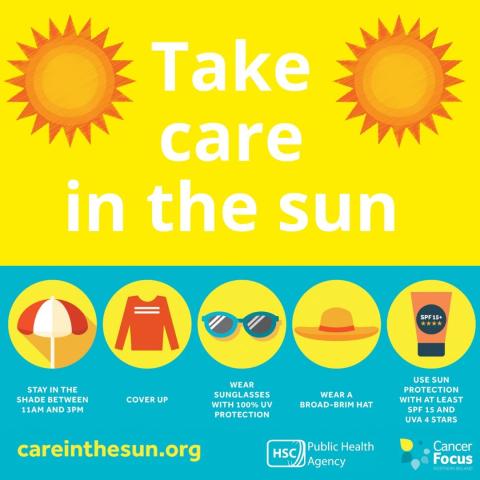‘Care in the sun’ Living Well campaign launched

A new campaign focusing on the importance of getting the best from your sunscreen and reducing your risk of skin cancer has been launched in community pharmacies across Northern Ireland.
‘Care in the sun’ is running in community pharmacies throughout June and July as part of the Living Well service.
Living Well is offered in over 500 pharmacies across Northern Ireland and provides information and advice on public health issues. It is delivered in partnership by the Public Health Agency (PHA), Community Pharmacy NI (CPNI), and the Department of Health (DoH).
Denise McCallion, Health Improvement Manager at the PHA, said: “Sunlight helps provide our bodies with vitamin D, supports bone health, lowers blood pressure, helps prevent disease and promotes good mental health. However, over-exposure to UV radiation can damage skin and the majority of skin cancers are caused by over exposure to UV radiation.”
“Skin cancer is the most common cancer in Northern Ireland and accounts for over 31% of all cancers diagnosed. Over 4,000 people develop skin cancer each year and almost 1 in 10 of these are malignant melanoma, the most serious form. Malignant melanoma rates have risen over the past 30 years from an average of 103 cases per year in the mid-1980s, to 382 cases in recent years.”
According to the charity Skcin, around 90% of all skin cancers are caused by over-exposure to UV radiation from the sun and/or sunbeds. This means that the majority of all skin cancers are preventable by undertaking simple sun protection measures.
Stephen Slaine, community pharmacist, added: “Community pharmacists regularly help patients with a range of common health concerns associated with ‘Care in the sun’ such as skin protection, treatment for sun exposure and mole concerns. This campaign is an opportunity for you to chat to your local pharmacist or pharmacy team about how to look after your skin, how to stay safe in the sun, talk about medication that could increase your skin’s sensitivity to sunlight and also to raise any concerns, especially in relation to prevention and early detection of skin cancer.”
Top tips for protecting your skin from cancer
• Check when you are most at risk from UV radiation. Levels of UV radiation are highest in Northern Ireland between March and October – even when it is cool or overcast. UV rays are strongest between 11.00am and 3.00pm.
• If you over expose yourself to UV radiation, you increase your risk of sunburn, premature skin ageing and skin cancer.
• Check the UV index. The index indicates how much solar UV radiation is reaching the Earth’s surface and how careful we need to be. UV levels vary with the seasons and time of day, but when the UV index is 3 or more our skin needs protected. If you are going outdoors, check what the UV index will be throughout the day. You can check daily and hourly UV index forecasts via an app on your mobile phone.
Help protect your skin when the UV index is 3 or more by following this guidance:
- Stay in the shade between 11.00am and 3.00pm, when UV rays are strongest.
- Cover up with suitable clothing.
- Wear a broad brimmed hat and sunglasses with 100% UV protection.
- Buy sunglasses that have a CE mark or carry British StandardBS EN ISO 12312-1.
- Use sunscreen on exposed skin; an SPF of at least 15 and UVA 4 stars as recommended by the Department of Health and National Institute for Health and Care Excellence.
- Babies under six months should stay out of direct sunlight. If exposure to sunlight is unavoidable, apply a small amount of high protection sunscreen to exposed areas, such as the cheeks and back of the hands. For children over six months choose SPF 30 or SPF 50 to protect against UVB rays and minimum UVA 4 stars. Higher SPF will give more protection.
- Avoid sunburn by never allowing your skin to go pink or red in the sun. Sunburn doesn’t have to be raw, peeling or blistering skin; for people with darker skin it might feel tender, irritated or itchy.
- Choose and use the correct amount of sunscreen – an adult needs six teaspoons distributed evenly on the body with an SPF of at least 15 and UVA 4 or 5 stars.
- Avoid sunbeds – they can cause over exposure to UV radiation.
- Check your skin at least once a month, be aware of any changes, and speak to your GP or pharmacist if you notice any mole changes, new moles or abnormal skin changes.
Doreen Regan, Skin Cancer Prevention Coordinator at Cancer Focus NI, said that it’s important to remember the care in the sun messages both at home and abroad: “Everyone is at risk of UV damage, but certain groups are particularly at risk including babies and children, those with fair hair and skin, outdoor workers and people with a family history of skin cancer. Just one episode of sunburn, especially in childhood, can double the lifetime risk of malignant melanoma, the most serious form of skin cancer.”
To find out more visit www.careinthesun.org or call into your local pharmacy.
If you are concerned about skin cancer you can call the Cancer Focus NI free information and support NurseLine on 0800 783 3339 or email one of the charity’s nurses on nurseline@cancerfocusni.org

